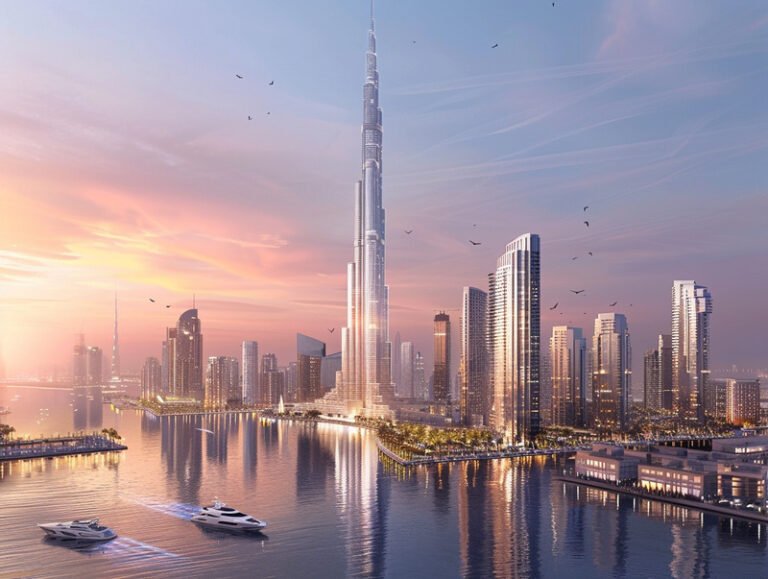Overview of Government Regulations for Off-Plan Properties

Dubai's government regulations for off-plan properties are designed to protect investor interests and maintain market stability. These comprehensive rules cover various aspects of property development and sales, ensuring transparency and accountability in the emirate's real estate sector.
For potential investors, understanding these regulations is crucial for making informed decisions and navigating the off-plan property market effectively. Key areas covered include deposit protection, construction timelines, and developer obligations.
These policies create a secure environment for off-plan property investments in Dubai, fostering confidence among local and international buyers. Let's examine the main components of these regulations and their impact on the investment process.
The Real Estate Regulatory Agency (RERA) oversees off-plan property transactions in Dubai. Developers must register their projects with RERA and obtain necessary approvals before launching sales. This ensures that only legitimate projects enter the market, reducing the risk of fraud.
Let us help you find the perfect property. Contact us to get started.
Escrow accounts are mandatory for off-plan developments. Developers must deposit buyer payments into these accounts, which are monitored by RERA. This protects investors' funds and ensures that money is used solely for project construction.
Construction progress is closely monitored, with developers required to meet specific milestones before requesting further payments from buyers. This helps prevent delays and ensures timely project completion.
Investors have the right to cancel their contracts and receive refunds if developers fail to meet agreed-upon construction deadlines. This provision incentivizes developers to complete projects on time and protects buyers from excessive delays.
Key Takeaways
Dubai's real estate market, particularly for off-plan properties, is governed by strict regulations to protect buyers and ensure market stability. The Real Estate Regulatory Agency (RERA) oversees these regulations, which have evolved since the property boom of the early 2000s. These rules cover various aspects of off-plan property purchases, from developer licensing to buyer protections, and have helped establish Dubai as a secure investment destination for both local and international property investors.
Dubai's regulations mandate deposit protection schemes and escrow account management. Developers must deposit all payments received from buyers into an escrow account, which is monitored by RERA. This ensures funds are used solely for the project's construction and protects buyers' investments.
RERA enforces construction milestones and timelines to safeguard investor interests. Developers must adhere to agreed-upon schedules, with penalties for delays. This ensures timely project completion and helps maintain buyer confidence in the off-plan property market.
Before selling off-plan properties in Dubai, developers must obtain licenses from RERA. This process involves demonstrating financial stability and technical expertise, ensuring only qualified developers enter the market. It adds an extra layer of security for buyers investing in off-plan properties.
Dubai's regulations provide strong contractual rights for off-plan property buyers. These include the right to regular project updates, protection against unreasonable delays, and guarantees for defect rectification. Such provisions help balance the relationship between developers and buyers.
Financial transparency is a key focus of Dubai's real estate regulations. Developers must disclose project funding details and provide accurate marketing materials. This transparency helps buyers make informed decisions and reduces the risk of fraudulent practices in the off-plan property market.
Deposit Protection Schemes
When purchasing off-plan property in Dubai, understanding deposit protection schemes is crucial. These schemes safeguard your initial investment if the developer faces financial difficulties or fails to complete the project. In Dubai, the Real Estate Regulatory Agency (RERA) oversees these protections, ensuring developers comply with regulations.
Dubai's deposit protection system operates through escrow accounts. Developers must open these accounts with approved banks, where buyers' payments are securely held. This system ensures that funds are only released to developers based on construction milestones, as verified by RERA-approved engineers.
Before making any payments, verify that the developer has a RERA-approved escrow account. Request the account details and confirm their validity with RERA. This step is crucial for protecting your investment.
When making a deposit, ensure you receive proper documentation, including a receipt specifying the escrow account details. Keep all transaction records safe, as they may be needed for future reference or in case of disputes.
Construction Milestones and Timelines
Construction milestones and timelines are crucial when investing in Dubai's off-plan properties. The government has implemented regulations to ensure developers adhere to specific schedules and provide transparency to buyers. These regulations require developers to establish clear construction milestones and communicate them effectively to investors. Understanding these timelines helps protect your interests and ensures timely delivery of your property.
Project timelines in Dubai typically include stages such as foundation work, structural completion, and finishing touches. Each milestone corresponds to a specific percentage of project completion, often linked to payment installments.
Developers must obtain necessary permits and approvals before starting construction. They're also required to provide regular progress updates to investors and regulatory authorities.
The Dubai Land Department oversees construction timelines and can penalize developers who don't comply. As an investor, carefully review the construction schedule in your sale and purchase agreement to ensure it aligns with government regulations.
If a developer fails to meet agreed-upon milestones, you may have the right to seek compensation or terminate the contract. This safeguard helps protect your investment in Dubai's real estate market.
Developer Licensing Requirements
Dubai's real estate market enforces strict licensing requirements for property developers to protect investors and maintain quality standards. These regulations ensure only qualified and financially stable companies can undertake off-plan property projects. Understanding these requirements is crucial for potential investors in Dubai's off-plan properties.
Developers must obtain a license from the Real Estate Regulatory Agency (RERA) before selling off-plan properties. To qualify, they must demonstrate financial stability, technical expertise, and a proven track record in real estate development. They're also required to open an escrow account for each project, protecting buyers' investments.
Detailed project plans, including architectural designs, construction timelines, and financial projections, are mandatory. Developers must register all off-plan properties with the Dubai Land Department and obtain necessary permits before construction begins.
These stringent requirements help minimize the risk of project delays or failures, providing greater confidence to investors in Dubai's off-plan property market.
Buyer's Contractual Rights
Dubai’s off-plan property market offers buyers specific contractual rights to protect their interests throughout the purchase process. These rights ensure transparency, security, and peace of mind for investors. Buyers are entitled to detailed sales agreements, regular construction updates, and protection against arbitrary changes or delays. Additionally, buyers can also request market trends analysis to help make informed decisions about their investment. This information can provide valuable insights into the future potential of their off-plan property, allowing them to assess the market demand and potential resale value. Overall, these contractual rights and additional services contribute to a more secure and informed off-plan property buying experience in Dubai.
The sales agreement must include property specifications, payment schedules, and expected completion dates. Buyers have the right to receive regular updates on construction progress and potential delays. Compensation or contract termination options are available if developers fail to meet agreed-upon completion dates.
Buyers are protected against unauthorized changes to property design or specifications. In case of project cancellation, full refunds are guaranteed. Payments are held in escrow accounts until specific construction milestones are met, safeguarding buyer funds.
Buyers have the right to inspect properties before final handover and request rectification of any defects. These contractual rights aim to provide a secure investment environment in Dubai's off-plan property market.
Financial Transparency Rules
Dubai's real estate market has embraced stringent financial transparency rules for off-plan property transactions. These regulations aim to safeguard buyers and maintain market integrity. Developers are now required to provide detailed financial information about their projects, ensuring potential buyers have access to crucial data before making a purchase decision.
The new rules mandate that developers disclose their project's financial structure, including funding sources and escrow account details. This transparency allows buyers to assess the developer's financial stability and the project's viability. Regular updates on construction progress and any changes to the project timeline or specifications are also required.
Developers are restricted in how they can use buyer payments, with a specified percentage allocated solely for construction purposes. This measure helps guarantee timely project completion and protects investments.
Buyers now have the right to review developers' audited financial statements, providing insight into their overall financial health. This added layer of transparency aids in making informed decisions.
Marketing materials are also subject to these transparency rules. Developers must provide accurate and complete information in their promotional content, preventing misleading claims about properties or their features.
Quality Assurance Standards
Dubai's off-plan property market adheres to three key quality assurance standards, safeguarding buyers and maintaining high construction benchmarks. These standards ensure that developers follow strict building codes, undergo mandatory inspections throughout construction, and complete a final quality assessment before handover. By implementing these measures, Dubai aims to protect investors and uphold its reputation for world-class real estate development.
Developers must comply with rigorous building codes and regulations covering structural integrity, safety features, and overall construction quality. These standards ensure that every off-plan property meets Dubai's high expectations for modern, safe, and well-built homes.
Throughout the construction phase, independent third-party inspectors regularly visit the site to verify progress and compliance with standards. Buyers receive reports on these inspections, keeping them informed about the project's status and any potential issues.
Before handover, a comprehensive quality assessment is conducted. This evaluation examines all aspects of the property, from overall construction to individual fixtures and fittings. Any identified problems must be addressed by the developer before the property can be transferred to the buyer.
Escrow Account Regulations
Dubai's escrow account regulations have been vital to the off-plan property market since 2007. These rules protect buyers' funds and ensure developers use money for its intended purpose. When purchasing an off-plan property in Dubai, understanding these regulations is crucial for safeguarding your investment.
Developers must open an escrow account for each project, depositing all buyer funds into this account managed by an approved bank. Funds are released in stages as construction progresses, preventing misuse of buyers' money.
This system offers increased transparency and security for buyers. You have the right to request information about the escrow account, including deposits and withdrawals. If a project is cancelled or significantly delayed, your chances of recovering your investment are higher.
These regulations also help prevent developers from overextending themselves. This reduces the risk of project failures and contributes to the overall stability of Dubai's real estate market.
Cancellation and Refund Policies
Understanding cancellation and refund policies is crucial when investing in off-plan properties in Dubai. The Dubai Land Department has established guidelines to protect both buyers and developers. Your sale and purchase agreement outlines specific terms for cancellations and refunds. Review this document carefully if you're considering cancelling your purchase.
Cancellation before construction typically entitles you to a full refund minus a small administrative fee. Once construction begins, refund amounts decrease based on project completion percentage. If the developer fails to meet obligations or significantly delays the project, you may be eligible for a full refund.
Developers must follow strict procedures when cancelling a sale due to buyer default. They must notify you and the Dubai Land Department, allowing a 30-day grace period for you to fulfill your obligations. If you don't comply, the developer can proceed with cancellation but must refund a portion of your payments according to regulations.
Marketing and Advertising Guidelines
Dubai's real estate market is governed by stringent marketing and advertising guidelines for off-plan properties. These regulations, enforced by the Dubai Land Department and RERA, aim to protect buyers and maintain market integrity. The guidelines cover various aspects of promotional activities, ensuring transparency and accuracy in all communications. Developers must adhere to these rules when marketing their projects, whether through traditional media, digital platforms, or property exhibitions.
Key requirements for off-plan property advertisements in Dubai include the project's RERA registration number, accurate representations of property features, and clear statements about completion dates. Developers must also provide disclaimers regarding potential changes during development.
Dubai's regulations prohibit unrealistic promises or misleading images in marketing materials. Developers are obligated to provide accurate floor plans, specifications, and payment schedules to potential buyers.
Property exhibitions and roadshows in Dubai are also regulated. Organizers must obtain permits and follow specific guidelines to ensure compliance with local laws and protect consumer interests.
Environmental and Zoning Compliance
Environmental regulations and zoning laws in Dubai's real estate sector are complex and crucial for off-plan property developers. These rules cover energy efficiency, waste management, and green building practices. Developers must conduct environmental impact assessments before construction to protect local ecosystems and resources. Zoning compliance dictates building locations, heights, setbacks, and land use designations, aligning with Dubai's urban planning vision.
Strict guidelines govern water conservation, air quality control, and noise pollution mitigation. Dubai's focus on sustainable development requires incorporating renewable energy systems and eco-friendly materials into designs. Developers must stay informed about changing regulations to avoid fines, project delays, or permit cancellations.
Compliance with height restrictions and setback requirements is essential in Dubai's real estate market. These rules maintain the city's aesthetic appeal and prevent overcrowding.
Water conservation is a priority in Dubai's arid climate. Developers must implement efficient irrigation systems and water-saving fixtures in their projects.
Incorporating renewable energy sources, such as solar panels, is increasingly important in Dubai's real estate developments. This aligns with the city's sustainability goals and can lead to long-term cost savings.
Conclusion
Dubai's regulatory framework for off-plan properties is comprehensive and investor-focused. These regulations aim to protect buyers and ensure developer accountability in the emirate's dynamic real estate market.
From deposit safeguards to construction milestones, environmental standards to contract transparency, Dubai's authorities have implemented a robust system of checks and balances.
Understanding these regulations is crucial for anyone considering off-plan property investments in Dubai. They provide a safety net, reducing risks associated with unfinished projects and potential developer defaults.
Key aspects include the escrow account system, which protects buyer deposits, and the requirement for developers to register projects with the Dubai Land Department before selling units.
Environmental compliance and construction quality standards are strictly enforced, ensuring sustainable and high-quality developments.
Contractual transparency is mandated, with developers required to provide detailed information about project timelines, specifications, and payment schedules.
While these regulations offer substantial protection, investors should still conduct thorough due diligence and seek professional advice before committing to any off-plan property purchase in Dubai.
Let us help you find the perfect property. Contact us to get started.





